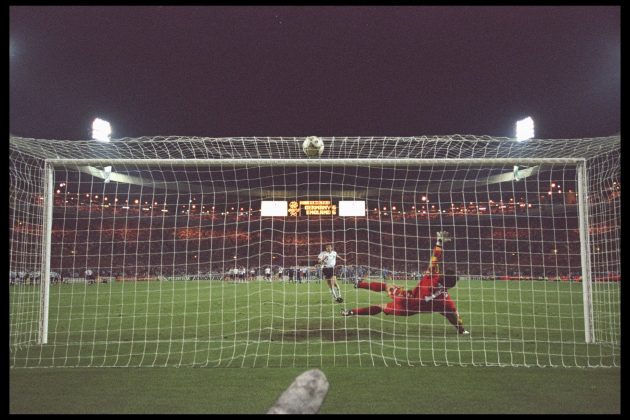How Germany are using data science at Euro 2020 and why it won’t help them in a penalty shoot-out against England

It’s hard to tell whether Pascal Bauer is being modest about his own work or afraid of giving too much away when he talks about Germany’s Euro 2020 showdown with England.
As a senior data scientist for German football federation (DFB), he has an important role in preparing the team for matches like tomorrow’s last-16 tie at Wembley.
But although part of that involves identifying the weaknesses of their opponents, Bauer is coy when asked about England’s shortcomings.
“I think England have a very talented squad with a lot of individual strength, like we do,” he says.
“There is not one key insight where we say ‘this is the biggest weakness, we should go only in this direction’.”
It is more a case of using data to back up or disprove hunches that Germany’s coaches and players have developed from watching or playing against England’s, Bauer adds.
“The insights we create are just objectifying the feelings. It’s nothing too special, I’d say. We’re expecting a very good opponent.”
How Germany adapted quickly to drawing England
Germany, like other teams, have access to vast amounts of statistics to plot their course through Euro 2020.
Four million data points are captured at every game of the tournament. On top of that, the DFB videos all training sessions.
“The context and interpretation is down to the coaching staff,” says Sebastian Koppers, project lead at the DFB’s TechLab. “We provide them with data that hopefully helps them but in the end they make the decisions.”
If a key advantage of data is that it speeds up decisions, that has been particularly useful since Germany only found out they would be playing England five days ago.
“We had three or four options and had to prepare for them all,” says Bauer. “We save the analysts time so they don’t need to go through all the video footage of England to see what they’re facing.”

Analysts must be careful not to “overload” coaches and players with information on opponents, Bauer says.
In any case, Germany coach Joachim Low is unlikely to rip up his strategy and tailor his tactics to toppling England.
“Like England, we don’t try to adapt our playing style to any opponent too much,” says Bauer. “We want to have our playing philosophy which does not change every week.”
Stats help balance praise and criticism
Data does not provide silver bullets, says Bauer. “I think it’s kind of a myth that you get one big insight from data that coaches never knew before.”
Where it can help is in validating a gut instinct, perhaps about a player’s fitness or whether the team ran less in a given game.
“They’ve got a feeling, but we can provide them with objective analysis which makes their decision more informed,” he adds.
Training stats help to determine the right intensity of sessions the day before a match. It varies for each player and is seen as a vital part of tuning up.
Moreover, data has been useful to the Germany camp in assessing their true level so far at Euro 2020, following wildly fluctuating public reactions to their 4-2 win over holders Portugal and 2-2 draw with unfancied Hungary.
“When everyone was saying we were so bad against Hungary, we have metrics that help to qualify the performance and say ‘hey, it wasn’t that bad actually’ or ‘the difference between the Portugal and Hungary matches wasn’t that huge’,” Bauer says.
Can data help Germany beat England on penalties?
Germany’s technology and data specialists work across all national teams, not just the senior men’s team.
Long before they arrive at major tournaments, the analysis they facilitate helps to identify the most talented players and coaches.
Euro 2020, however, is also helping them to build a complete database of German football, alongside software company Exasol
“This is part of a project to make all this data usable,” says Koppers. “It’s one piece of a large puzzle.”

If there is one element that the DFB’s sharpest analytical minds can’t help much with, however, it is penalties.
While it’s true that German teams coped just fine in 1990 and 1996, it is a crumb of comfort should England face the scenario fans fear most.
“From a data perspective, we didn’t work that much on penalty shoot-outs,” says Bauer.
“The data we have from history is from so long ago that it’s different players. For sure, there is some information on where those players taking penalties usually shoot them for their clubs. But there is not much of a database that really helps us to predict stuff at penalties.”
The latest Exasol podcast with the DFB TechLab team behind Germany at Euro 2020 can be found here.
